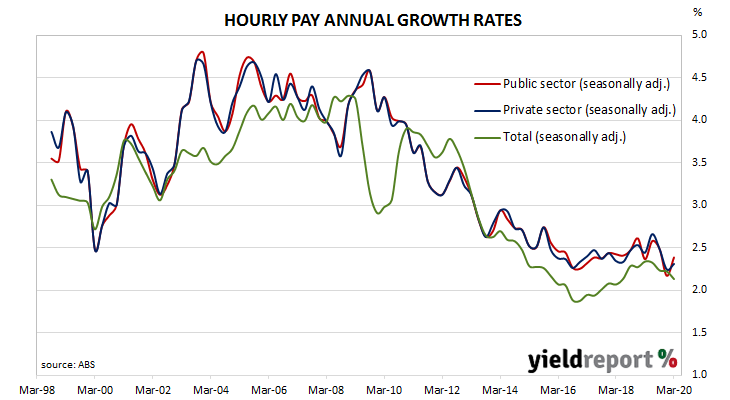Summary: March quarter price indices similar to previous quarters; result largely “pre-pandemic”; ABS underutilisation rate points to slowdown; economists forecast a difficult period for household incomes.
After unemployment increased and wage growth slowed during the GFC, a resources investment boom prompted a temporary recovery back to nearly 4% per annum. However, from mid-2013 through to the September quarter of 2016, the pace of wage increases slowed until mid-2017 when it began to slowly creep upwards. The December quarter’s figures were suggestive of a decreasing growth rate and the latest report is of a similar nature. However, it is unlikely to reflect any changes which may have taken place recently.
According to the latest wage price index (WPI) figures published by the ABS, hourly wages grew by 0.5% in the March quarter. The increase was in line with the expected figure and the same rate as in each of the previous quarters going back to June 2019. The year-on-year growth rate slipped from December quarter’s 2.2% to 2.1%.
The report came out on the same day as the latest Westpac-Melbourne Institute consumer sentiment report. Local Treasury bond yields were almost unchanged, ignoring moderate falls in US Treasury markets overnight. By the end of the day, the 3-year ACGB yield had inched up 1bp to 0.24% while 10-year and 20-year yields finished unchanged at 0.95% and 1.61% respectively.
In the cash futures market, expectations of a rate cut hardly budged. By the end of the day, June contracts implied a rate cut down to zero as a 54% chance, unchanged from the previous day. July contracts implied a 65% chance of such a move in that month, also unchanged. Contract prices of months in the remainder of 2020 and through to mid-2021 implied probabilities ranging between 46% and 62%.
ANZ senior economist Catherine Birch said, “This result was essentially pre-pandemic, in that the survey reference period ended on 21 February when Australia had only 20 confirmed cases of COVID-19 and a month before non-essential services were shut down.”

